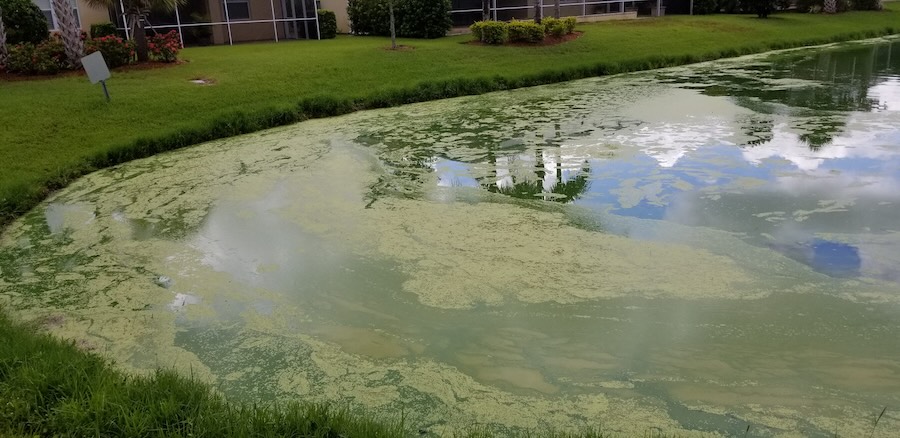

This month's H2O Zone brings a diverse set of stories, focusing on both land and sea. We dive below Florida's ocean waves, consider the challenges faced by the state's fruit farmers - and give due praise to a groundbreaking achievement at a Florida botanic garden.

On land, we delve into the struggles of lychee farmers and the multi-million dollar initiative to revitalize Florida's citrus industry. We also head out to sea, to explore how rising sea temperatures impact marine life, including efforts to create heat-resilient corals and the crucial role of seagrass. Back on dry land, we celebrate a world-first for a Florida botanical garden that is now contributing electricity to the state grid.

The The Marie Selby Botanical Gardens in Sarasota, a "living museum" showcasing botanical art and native tropical greenery since 1973, has become the world's first botanical garden complex to achieve net-positive energy status. Following a $51 million remodel, including a rooftop garden and solar panels, the gardens now generate more energy than they consume, feeding the surplus back into the Sarasota County energy grid.
Beyond its stunning displays, the gardens are global leaders in researching and preserving unique flora like epiphytic orchids, bromeliads, gesneriads and ferns.

While many might be wary of sharks, stable or increasing numbers of great white sharks off South Florida's coast are actually a positive sign for the region's ecosystem. R
esearchers from the University of Miami's Shark Research and Conservation program, who tagged over 550 sharks in Biscayne Bay in 2024, view these healthy populations as an indicator of a thriving marine environment. However, a concern remains as Biscayne Bay is warming significantly faster than the wider ocean, potentially impacting its suitability as a shark habitat. Ultimately, the continued presence of sharks suggests the ocean is being better cared for.

Warmer seas can impact Florida in often dramatic ways, but the subtle decline of seagrass meadows presents a long-term threat with significant consequences. Found in vast swathes on the seabed of areas like Florida Bay, unassuming seagrass is vital to the ecosystem. It absorbs carbon, filters water, provides habitat for marine creatures, and is the primary food source for manatees.
Past die-offs have been linked to drought and increased salinity, and there's concern that rising sea temperatures could have a similar effect by reducing oxygen absorption at night. Restoring natural water flow through the Everglades could help mitigate this by driving more freshwater into Florida Bay, supporting seagrass health even as temperatures rise.
Maintaining a healthy irrigation lake is crucial for efficiency, energy, and cost savings, challenging the assumption that these systems are self-regulating. In Florida, polluted lakes pose a significant problem, impacting water quality, equipment, and landscapes.
Key maintenance activities include aerating water to increase oxygen and deter algae; maintaining shorelines and buffer zones to control runoff and contamination; and removing sediment that reduces depth and fosters invasive plants. Furthermore, controlling invasive aquatic weeds and algae is vital for ecosystem health and water quality. Expert monitoring is often required.
In short, constant vigilance and excellent maintenance programs are essential for reducing bills, minimizing repairs, and meeting water use budgets.


Florida's coral reefs are crucial indicators of ocean health, and scientists are taking innovative steps to protect them. Researchers from the University of Miami, the Florida Aquarium, and Tela Marine in Honduras have successfully transplanted crossbred coral fragments onto a reef previously devastated by bleaching.
This multi-year initiative involved crossbreeding Florida corals with those from the warmer waters off Honduras, aiming to create strains resilient to temperatures 3.6 degrees warmer than current Florida waters. This pioneering project marks the first wild transplant of such crossbred corals, with scientists eagerly monitoring their progress this summer, hoping they will thrive where native corals have struggled.

Florida's lychee farmers are struggling to meet demand for this luxury fruit due to climate change. Traditionally, the short growing season made lychees a rare treat, but warmer winters and falls are now preventing trees from staying dormant, leading to reduced flower and fruit production. Additionally, blossoms are drying out in the heat before pollination.
This year's crop saw a brief reprieve from a January cold spell, but the overall trend of warmer early-year weather is a significant worry for farmers. They predict that lychee production will eventually shift northward, away from its current stronghold in South Florida.
Florida's citrus industry, facing a historic decline in production, is receiving a substantial boost with over $140 million earmarked in the state budget. The industry has seen a staggering 96% drop from its 1990s peak, with the 2024-2025 orange crop projected at only 12 million boxes. This decline is largely attributed to citrus greening, an incurable bacterial disease, and severe damage from Hurricanes Irma (2017), Ian (2022), and Milton (2024).
The majority of the funding, $105 million, will go to the Citrus Research and Field Trial Foundation (CRAFT) for research into disease-resistant varieties, sustainability, and pest control. While the scale of the challenge is immense, the industry draws hope from examples like Brazil, which has seen its citrus harvests rebound despite similar issues.